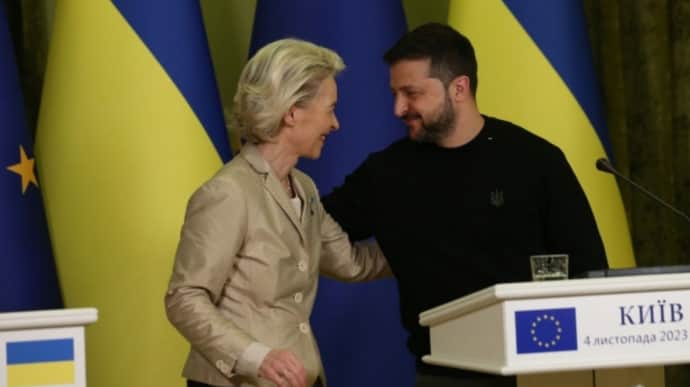EU has prepared new sanctions against Russia and financial aid package for Ukraine ahead of invasion anniversary – FT

The EU is preparing new sanctions against Russia and financial aid for Kyiv ahead of the second anniversary of Russia’s full-scale invasion of Ukraine in an attempt to compensate for declining Western aid supplies to Ukraine.
Source: Financial Times, citing sources
Quote: "The package includes a 13th set of restrictions on businesses and individuals connected to the 2022 full-scale invasion of Ukraine, as well as a long-delayed agreement on €50 billion for Kyiv over the next four years, some of which could be paid out as soon as a deal is struck."
Details: "Another €5bn in military assistance per year and a decision to set aside profits arising from Russia’s frozen assets are also part of the overall set of support measures," the Financial Times says.
"It’s money, weapons and sanctions at a time when we recognise [the Ukrainians] need encouragement," said one EU diplomat involved in negotiations over the package.
"But two years in, there are limits to what we can do," they noted.
Privately, Ukrainian officials have expressed concern about the decrease in Western support over the last few months, and the risk of economic collapse and military reversals if key allies do not provide additional aid.
"EU leaders in December failed to agree on the four-year financing for Kyiv and in Washington, Congress has been unable to give a green light to US military and financial aid for this year. As a result, Ukrainian armed forces have started rationing their ammunition at a time when Russia has intensified its aerial attacks," the FT adds.
The new EU sanctions will focus on adding more individuals and legal entities to the asset freeze and travel ban list, and are unlikely to include a ban on Russian aluminium imports as requested by Poland and the Baltic states.
"Other elements could also be watered down to secure support, as previous attempts by some member states to target Russia’s nuclear fuel and liquefied natural gas exports to the EU have failed because of a lack of consensus," the article states.
The €50 billion financial aid package was proposed last year within the framework of an EU budget update which is due to be signed by EU leaders when they meet on 1 February. Hungarian Prime Minister Viktor Orbán blocked the agreement in December, and now the European Commission is ready to make concessions in order to get him on side, including giving him the possibility of reviewing the aid further down the line.
But EU diplomats have said they are certain that the Hungarian leader will finally give in, as he has done before.
"If Orbán blows up the [EU budget top-up], it’s like a political exit from the union," a senior EU diplomat said.
Another additional element is the possibility of advancing some of the aid — the exact amount is still being negotiated — to Ukraine as soon as leaders and the European parliament sign off on the package.
Negotiations are also underway on reforming the European Peace Fund (EPF) which has financed weapons supplies to Ukraine.
The negotiations are focused particularly on "gradually phasing out" reimbursements to capitals for the weapons they sent to Ukraine, and replacing them with payments for joint production of weapons instead.
Countries with large arms industries, such as Germany, want that phase-out to happen faster than those without.
Support UP or become our patron!





